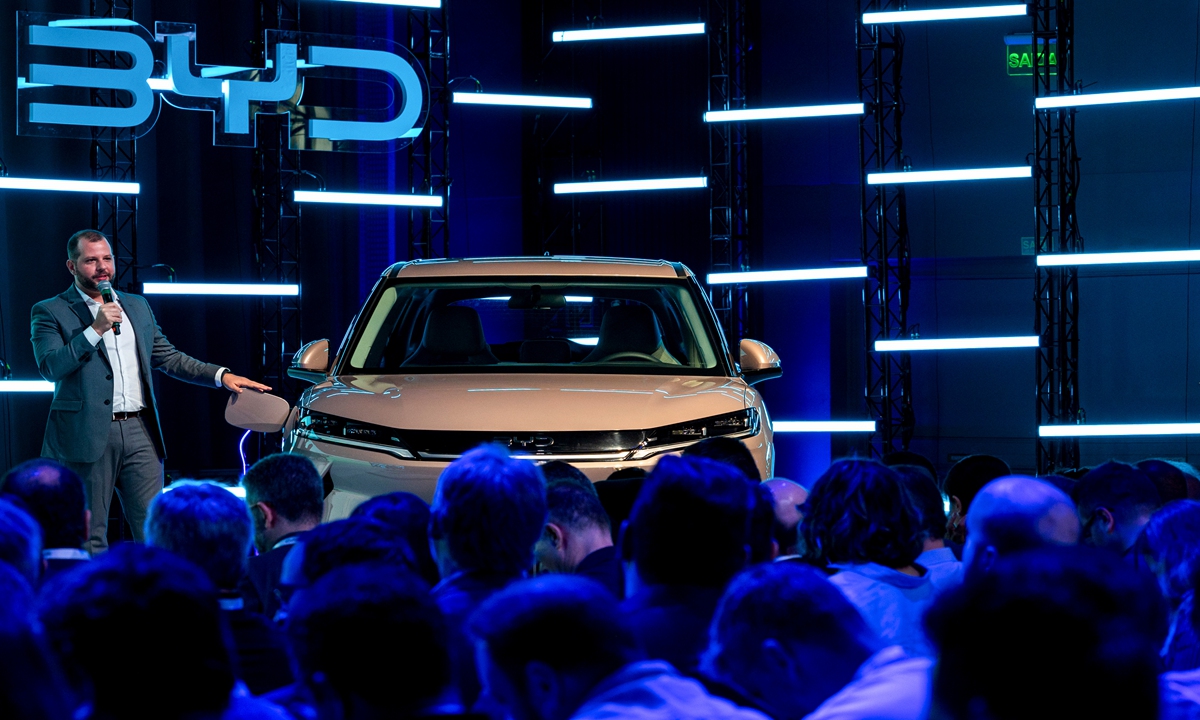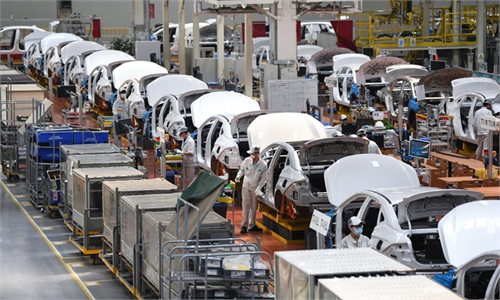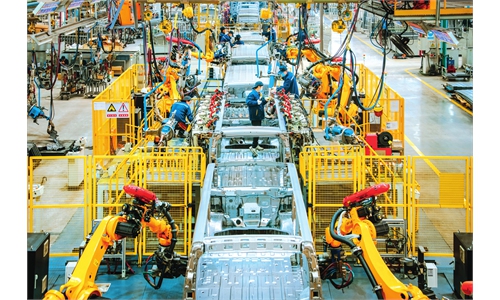Exploring Global South market for NEVs
To accelerate global green transition, Chinese automakers are ready to expand cooperation with more countries

BYD YUAN PRO, an electric compact SUV, was put on display during a launch event at Clube Monte Libano in S?o Paulo, Brazil, on September 5, 2024.
China's new energy vehicle (NEV) industry is making significant progress in recent years, marked by rapidly growing exports to many countries all over the world. Despite increasing trade protectionism in North America and Europe, industry experts have confidence that China's NEV export momentum will sustain, with Global South countries emerging as a major market.
In the first 11 months of the year, China exported 1.14 million NEVs, marking a year-on-year growth of 4.5 percent, according to latest data released by China Association of Automobile Manufacturers (CAAM).
Nevertheless, the data for November showed a drop in NEV exports, with 83,000 units shipped overseas - representing a month-on-month decrease of 35.2 percent and a year-on-year drop of 14.1 percent.
Although the tariff barriers erected by Europe and the US on Chinese NEVs are starting to produce negative impact on exports, Chinese-made electric vehicles and hybrid cars are seeing growing success in the emerging markets, the Global South countries in particular, revealed a NEV trader based in Chengdu, Southwest China's Sichuan Province.
Changing landscape
Wang Jian, a manager of the NEV trader, told the Global Times on Monday that Chinese NEVs continue to be attractive abroad. In Brazil, a rising number of consumers are impressed with the advanced features and high quality of Chinese-made NEVs, and that edge will help create new market opportunities for Chinese auto exports.
Wang has made multiple trips to Brazil for market research. He noted that the Brazilian market has long been dominated by European, American, and Japanese car brands, with older models like Chevrolet, Renault, Fiat, and others prevalent in the country. But, fossil fuel-powered traditional vehicles are giving way to NEVs thanks to local consumers' rising awareness of cutting carbon dioxide emissions. Currently, the competition between internal combustion engine cars and NEVs is fierce.
Ranked as Latin America's largest auto market and the sixth largest globally, Brazil holds significant potential for absorbing Chinese NEVs. According to a Bloomberg report in November, 90 percent of passenger electric vehicles sold in Brazil in the first six months of this year were made by Chinese automakers.
The Brazilian market offers a snapshot of China's NEV penetration in the market of Global South, experts said.
"With cascading changes in the global economic landscape, the developing countries are mostly witnessing a growing tendency in accepting NEVs, outpacing the developed countries such as Europe and the US. The Global South market, including the Southeast Asia, the Middle East, Africa, and Latin America countries, are now emerging as very important markets for the next phase growth of China's automotive sector," Sun Xiaohong, secretary general of the automotive branch of the China Chamber of Commerce for Import and Export of Machinery and Electronic Products, told the Global Times.
In recent years, Sun has received growing inquiries from many customers in emerging market economies who are looking to strengthen ties with Chinese NEV industry.
Massive growth potential
A few years ago, limited production capacity constrained Chinese NEV makers to focus on exploring domestic market and the developed economies in the West. "Now, overseas market landscape has changed a lot, as the Global South market is to bring rapidly growing trade opportunities for Chinese-made vehicles," Sun said.
Firstly, the emerging market presents vast opportunities. With increasing emphasis placed on the globe's environmental sustainability, the market is open to accept environment-friendly and technologically advanced NEVs, in which China owns advantages in technology and manufacturing scale, Sun noted.
In 2023, Chinese automaker BYD, the largest NEV maker in the world, announced plans to establish a production facility in the Brazilian state of Bahia. In March 2024, BYD's manufacturing complex there started operation. With an investment of 3 billion reals ($620.5 million), the NEV plant is expected to create more than 5,000 local jobs.
And, in South Africa, Chinese automakers, including Great Wall and BYD have launched a wide range of electric vehicle models, which are enthusiastically received by local consumers.
In Egypt, the number of electric vehicles registered in the first quarter this year made up one-third of all NEV registrations in the last three years, with the vast majority coming from China. In Kigali, the capital of Rwanda, BYD, in partnership with a local company, established East Africa's first BYD EV dealership, Xinhua News Agency reported on Thursday.
In the first nine months of 2024, China's NEV exports to Mexico saw a remarkable 557.9 percent year-on-year increase, according to economic news site yicai.com.
CAAM data showed that China's annual production of NEVs exceeded 10 million units for the first time on November 14, cementing its position as the first nation globally to achieve an annual production capacity of 10 million NEVs.
"With 90 percent of the vehicles purchased by domestic consumers, the fast growth of China's NEV industry highlights the potential of China's mega-sized market. It also demonstrates the firm resolve of the Chinese government to advance green and low-carbon development and contribute to global carbon neutrality," Foreign Ministry Spokesperson Lin Jian told a press briefing on November 15.
Citing statistics from the International Energy Agency, Lin noted that to realize carbon neutrality, total global EV sales will need to reach 45 million in 2030. "China will continue to deepen cooperation in the industrial and supply chains of new energy, advance tech innovation and the development of relevant sectors to offer the world more high-quality green products and better turbocharge global green development," Lin said.



